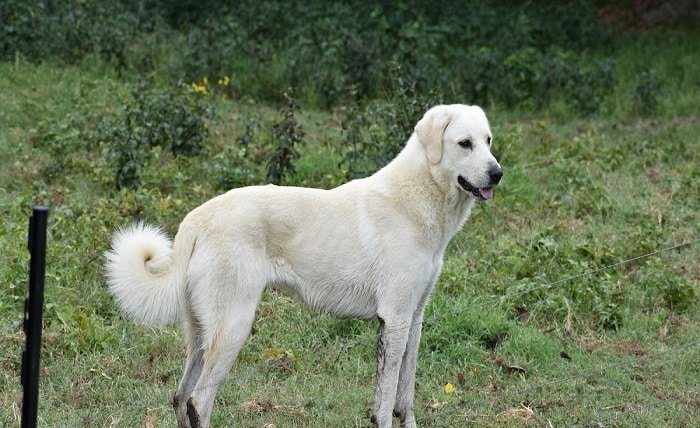Anatolian Shepherd: The Ultimate Guide to This Loyal and Powerful Guardian Breed

The Anatolian Shepherd is one of the most ancient and powerful guardian breeds, known for its unwavering loyalty and protective instincts. Originating from the Anatolian Plateau in Turkey, the Anatolian Shepherd has been bred for centuries to guard livestock against predators. This breed is admired not only for its impressive size and strength but also for its intelligence and independence. The Anatolian Shepherd is deeply ingrained in Turkish culture, representing reliability and fearlessness in the face of danger.
The Anatolian Shepherd is not just any dog; it is a breed built for work, especially in harsh environments. Farmers and shepherds across the world, especially in rural and mountainous regions, have come to depend on the Anatolian Shepherd for its unmatched guarding abilities. If you’re considering bringing an Anatolian Shepherd into your home, understanding its origins is the first step in appreciating the remarkable history of this noble canine.
Anatolian Shepherd: Temperament and Personality Traits
When it comes to temperament, the Anatolian Shepherd is calm, reserved, and fiercely loyal to its family. The Anatolian Shepherd is known for being highly independent, which stems from its historical role in making autonomous decisions while guarding livestock. This breed is not overly affectionate like some other dogs, but its loyalty and devotion are undeniable.
The Anatolian Shepherd is generally quiet and watchful, always alert to potential threats. Due to its guarding instincts, the Anatolian Shepherd may be wary of strangers, making early socialization essential. It’s important to note that the Anatolian Shepherd thrives in environments where it has a clear purpose, as boredom can lead to undesirable behaviors. Because of its dominant and protective nature, the Anatolian Shepherd is better suited for experienced dog owners who understand firm yet respectful handling.
Living with an Anatolian Shepherd means respecting its independent nature while reinforcing your position as a consistent and calm leader. This balance is key to nurturing the best version of the Anatolian Shepherd’s noble personality.
Anatolian Shepherd: Ideal Living Conditions
Due to its heritage as a working guardian dog, the Anatolian Shepherd thrives in spacious, rural settings. An Anatolian Shepherd in an apartment or small home may feel confined and restless. The Anatolian Shepherd needs plenty of room to roam, ideally in a securely fenced yard or farm where it can stretch its legs and fulfill its natural guarding instincts.
The Anatolian Shepherd is not a breed that does well in urban settings unless provided with daily rigorous exercise and mental stimulation. Cold or hot weather doesn’t bother the Anatolian Shepherd much due to its thick double coat, which provides excellent protection against harsh climates.
Owners must understand that the Anatolian Shepherd has strong territorial instincts. It may consider your entire property as its domain, so a proper containment system is crucial. Whether you live in the countryside or manage a ranch, the Anatolian Shepherd can be a valuable asset in protecting livestock and property.
Anatolian Shepherd: Training and Socialization Tips
Training an Anatolian Shepherd requires patience, consistency, and a firm understanding of canine psychology. The Anatolian Shepherd is intelligent but not eager to please like some other breeds, making training a challenge for first-time dog owners. Starting early is crucial when training an Anatolian Shepherd, as bad habits can become deeply rooted due to the breed’s stubborn streak.
Socialization is equally important. Exposing your Anatolian Shepherd to a variety of people, animals, and environments will help it become a well-rounded adult dog. Without proper socialization, an Anatolian Shepherd can become overly suspicious or even aggressive toward unfamiliar faces.
Positive reinforcement, with rewards like praise, treats, or play, works well with the Anatolian Shepherd. Avoid harsh corrections, as this can damage the bond between owner and dog. Training sessions should be short and engaging, as the Anatolian Shepherd can lose interest quickly if it senses repetition or monotony.
With the right approach, the Anatolian Shepherd can grow into a well-behaved and loyal companion. It’s not about domination, but rather establishing mutual respect with your Anatolian Shepherd.
Anatolian Shepherd: Health and Common Medical Issues
Like all breeds, the Anatolian Shepherd has its share of potential health issues. Fortunately, the Anatolian Shepherd is generally a hardy and healthy breed, but prospective owners should still be aware of common concerns. Hip dysplasia, elbow dysplasia, and bloat are among the conditions that may affect the Anatolian Shepherd.
To ensure the long-term health of your Anatolian Shepherd, routine vet checkups, a balanced diet, and plenty of exercise are essential. It’s also important to source your Anatolian Shepherd from a reputable breeder who tests for genetic conditions. Health screenings can prevent costly and heartbreaking issues down the line.
The Anatolian Shepherd typically enjoys a lifespan of 11 to 13 years, which is relatively long for such a large breed. Owners should also keep an eye on the Anatolian Shepherd’s weight, as obesity can exacerbate joint issues and decrease mobility.
Preventive care, including vaccinations, flea/tick treatments, and dental hygiene, will help maintain your Anatolian Shepherd’s overall well-being. Being proactive about your Anatolian Shepherd’s health is one of the best gifts you can offer this loyal companion.
Anatolian Shepherd: Grooming and Coat Care
Grooming the Anatolian Shepherd is relatively low maintenance, though seasonal shedding can be intense. The Anatolian Shepherd has a dense double coat that protects it from both hot and cold weather. Weekly brushing is usually enough to keep the Anatolian Shepherd looking its best, but during shedding seasons—spring and fall—more frequent brushing may be needed.
Bathing an Anatolian Shepherd should be done only when necessary, as over-bathing can strip the coat of its natural oils. Regular nail trimming, ear cleaning, and dental care should also be part of your grooming routine for the Anatolian Shepherd.
Despite its size, the Anatolian Shepherd is a clean breed with minimal odor. Its natural coat sheds dirt, making upkeep easier than you might expect for a working breed. Keeping your Anatolian Shepherd well-groomed not only promotes a healthy coat but also gives you the opportunity to check for ticks, cuts, or signs of illness.
Whether you handle grooming yourself or visit a professional, maintaining your Anatolian Shepherd’s appearance is a part of showing care and attention to this magnificent breed.
Anatolian Shepherd: Feeding and Nutritional Needs
Feeding an Anatolian Shepherd requires understanding its size, activity level, and age. As a large and active breed, the Anatolian Shepherd needs a high-quality diet rich in protein, healthy fats, and essential nutrients. Owners should feed their Anatolian Shepherd age-appropriate food—puppy, adult, or senior formulas—to meet its changing needs over the years.
Portion control is vital, as overfeeding can lead to obesity, which puts strain on the Anatolian Shepherd’s joints. Dividing meals into two servings a day helps prevent bloat, a potentially life-threatening condition in deep-chested breeds like the Anatolian Shepherd.
Avoid feeding your Anatolian Shepherd table scraps or low-quality food with fillers and artificial additives. Fresh water should always be available, especially if your Anatolian Shepherd spends a lot of time outdoors or working.
Supplements like glucosamine may be recommended to support joint health, but always consult a vet before making changes to your Anatolian Shepherd’s diet. Proper nutrition is a cornerstone of your Anatolian Shepherd’s health, vitality, and longevity.
Anatolian Shepherd: Is This Breed Right for You?
Choosing an Anatolian Shepherd as a companion or working dog is a big decision that should not be taken lightly. The Anatolian Shepherd is not for everyone—it requires a dedicated, experienced owner who understands the breed’s strong will, independence, and need for purpose. If you’re looking for a low-energy lap dog, the Anatolian Shepherd is not the right choice.
However, for the right person or family, the Anatolian Shepherd is a loyal protector and lifelong companion. Whether you’re a rancher, a farmer, or someone with a large property looking for a devoted guardian, the Anatolian Shepherd can be an ideal fit.
Living with an Anatolian Shepherd means adapting to its needs, offering it space, guidance, and tasks that give it purpose. It’s a long-term commitment, but one that’s immensely rewarding for those who appreciate the breed’s strength, intelligence, and quiet devotion.
Conclusion
The Anatolian Shepherd is more than just a breed—it’s a living symbol of strength, loyalty, and resilience. With a legacy dating back thousands of years, the Anatolian Shepherd continues to serve and protect in a modern world, offering unparalleled companionship to those who respect its unique qualities.
Understanding the Anatolian Shepherd’s needs, from training and nutrition to grooming and health care, ensures a fulfilling relationship for both dog and owner. If you’re ready to meet the challenge, the Anatolian Shepherd will reward you with unwavering devotion and steadfast protection for years to come.
FAQs
1. Is the Anatolian Shepherd good with children?
Yes, the Anatolian Shepherd is typically good with children in its own family, though supervision is recommended due to its size.
2. How much exercise does an Anatolian Shepherd need?
The Anatolian Shepherd needs daily exercise and mental stimulation, preferably in large outdoor spaces.
3. Can the Anatolian Shepherd live with other pets?
The Anatolian Shepherd can live with other animals if socialized early, though its guarding instincts may surface around new pets.
4. How long does the Anatolian Shepherd live?
The average lifespan of an Anatolian Shepherd is 11 to 13 years with proper care and nutrition.
5. Are Anatolian Shepherds easy to train?
Training an Anatolian Shepherd requires patience and consistency due to its independent and stubborn nature.





